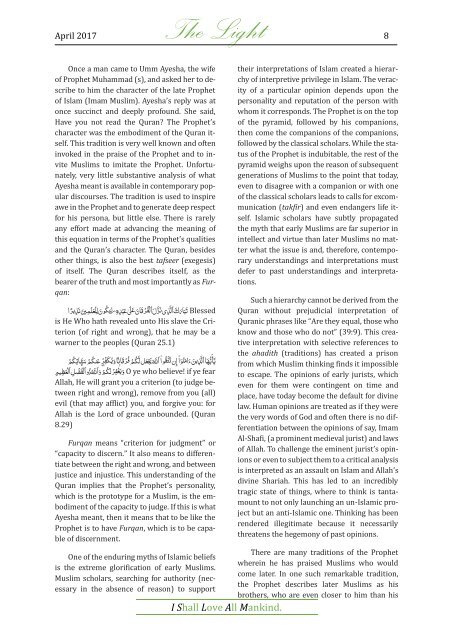2017 04 The Light April 2017
monthly Journal of the Ahmadiyya Association for the Propagation of Islam. Presenting Islam as a tolerant, liberal and peaceful religion as practiced by the Holy Prophet Muhammad (s).
monthly Journal of the Ahmadiyya Association for the Propagation of Islam. Presenting Islam as a tolerant, liberal and peaceful religion as practiced by the Holy Prophet Muhammad (s).
Create successful ePaper yourself
Turn your PDF publications into a flip-book with our unique Google optimized e-Paper software.
<strong>April</strong> <strong>2017</strong> <strong>The</strong><br />
<strong>Light</strong> 8<br />
Once a man came to Umm Ayesha, the wife<br />
of Prophet Muhammad (s), and asked her to describe<br />
to him the character of the late Prophet<br />
of Islam (Imam Muslim). Ayesha’s reply was at<br />
once succinct and deeply profound. She said,<br />
Have you not read the Quran? <strong>The</strong> Prophet’s<br />
character was the embodiment of the Quran itself.<br />
This tradition is very well known and often<br />
invoked in the praise of the Prophet and to invite<br />
Muslims to imitate the Prophet. Unfortunately,<br />
very little substantive analysis of what<br />
Ayesha meant is available in contemporary popular<br />
discourses. <strong>The</strong> tradition is used to inspire<br />
awe in the Prophet and to generate deep respect<br />
for his persona, but little else. <strong>The</strong>re is rarely<br />
any effort made at advancing the meaning of<br />
this equation in terms of the Prophet’s qualities<br />
and the Quran’s character. <strong>The</strong> Quran, besides<br />
other things, is also the best tafseer (exegesis)<br />
of itself. <strong>The</strong> Quran describes itself, as the<br />
bearer of the truth and most importantly as Furqan:<br />
Blessed تَبَارَكَ ٱل َذِى نَز َلَ ٱل ْفُرْقَانَ عََلَ ٰ عَبْدِهِۦ لِيَكُونَ لِلْعَلَمِنيَ نَذِيرًا<br />
is He Who hath revealed unto His slave the Criterion<br />
(of right and wrong), that he may be a<br />
warner to the peoples (Quran 25.1)<br />
فُرْقَانً ًۭا وََّيُكَف ِرْ عَنكُمْ سَيِ َاتِكُ ْم<br />
يَٓأَي ُهَا ٱل َذِينَ ءَامَنُو ٓ ا۟ إِن تَت َقُوا۟ َ ٱّلل َ َيَ ْعَل ل َكُمْ<br />
O ye who believe! if ye fear وَيَغْفِرْ ل َكُمْ ۗ وَٱّلل َ ُ ذُو ٱل ْفَضْ لِ ٱل ْعَظِ يمَِّ<br />
Allah, He will grant you a criterion (to judge between<br />
right and wrong), remove from you (all)<br />
evil (that may afflict) you, and forgive you: for<br />
Allah is the Lord of grace unbounded. (Quran<br />
8.29)<br />
Furqan means “criterion for judgment” or<br />
“capacity to discern.” It also means to differentiate<br />
between the right and wrong, and between<br />
justice and injustice. This understanding of the<br />
Quran implies that the Prophet’s personality,<br />
which is the prototype for a Muslim, is the embodiment<br />
of the capacity to judge. If this is what<br />
Ayesha meant, then it means that to be like the<br />
Prophet is to have Furqan, which is to be capable<br />
of discernment.<br />
One of the enduring myths of Islamic beliefs<br />
is the extreme glorification of early Muslims.<br />
Muslim scholars, searching for authority (necessary<br />
in the absence of reason) to support<br />
I Shall Love All Mankind.<br />
their interpretations of Islam created a hierarchy<br />
of interpretive privilege in Islam. <strong>The</strong> veracity<br />
of a particular opinion depends upon the<br />
personality and reputation of the person with<br />
whom it corresponds. <strong>The</strong> Prophet is on the top<br />
of the pyramid, followed by his companions,<br />
then come the companions of the companions,<br />
followed by the classical scholars. While the status<br />
of the Prophet is indubitable, the rest of the<br />
pyramid weighs upon the reason of subsequent<br />
generations of Muslims to the point that today,<br />
even to disagree with a companion or with one<br />
of the classical scholars leads to calls for excommunication<br />
(takfir) and even endangers life itself.<br />
Islamic scholars have subtly propagated<br />
the myth that early Muslims are far superior in<br />
intellect and virtue than later Muslims no matter<br />
what the issue is and, therefore, contemporary<br />
understandings and interpretations must<br />
defer to past understandings and interpretations.<br />
Such a hierarchy cannot be derived from the<br />
Quran without prejudicial interpretation of<br />
Quranic phrases like “Are they equal, those who<br />
know and those who do not” (39:9). This creative<br />
interpretation with selective references to<br />
the ahadith (traditions) has created a prison<br />
from which Muslim thinking finds it impossible<br />
to escape. <strong>The</strong> opinions of early jurists, which<br />
even for them were contingent on time and<br />
place, have today become the default for divine<br />
law. Human opinions are treated as if they were<br />
the very words of God and often there is no differentiation<br />
between the opinions of say, Imam<br />
Al-Shafi, (a prominent medieval jurist) and laws<br />
of Allah. To challenge the eminent jurist’s opinions<br />
or even to subject them to a critical analysis<br />
is interpreted as an assault on Islam and Allah’s<br />
divine Shariah. This has led to an incredibly<br />
tragic state of things, where to think is tantamount<br />
to not only launching an un-Islamic project<br />
but an anti-Islamic one. Thinking has been<br />
rendered illegitimate because it necessarily<br />
threatens the hegemony of past opinions.<br />
<strong>The</strong>re are many traditions of the Prophet<br />
wherein he has praised Muslims who would<br />
come later. In one such remarkable tradition,<br />
the Prophet describes later Muslims as his<br />
brothers, who are even closer to him than his














